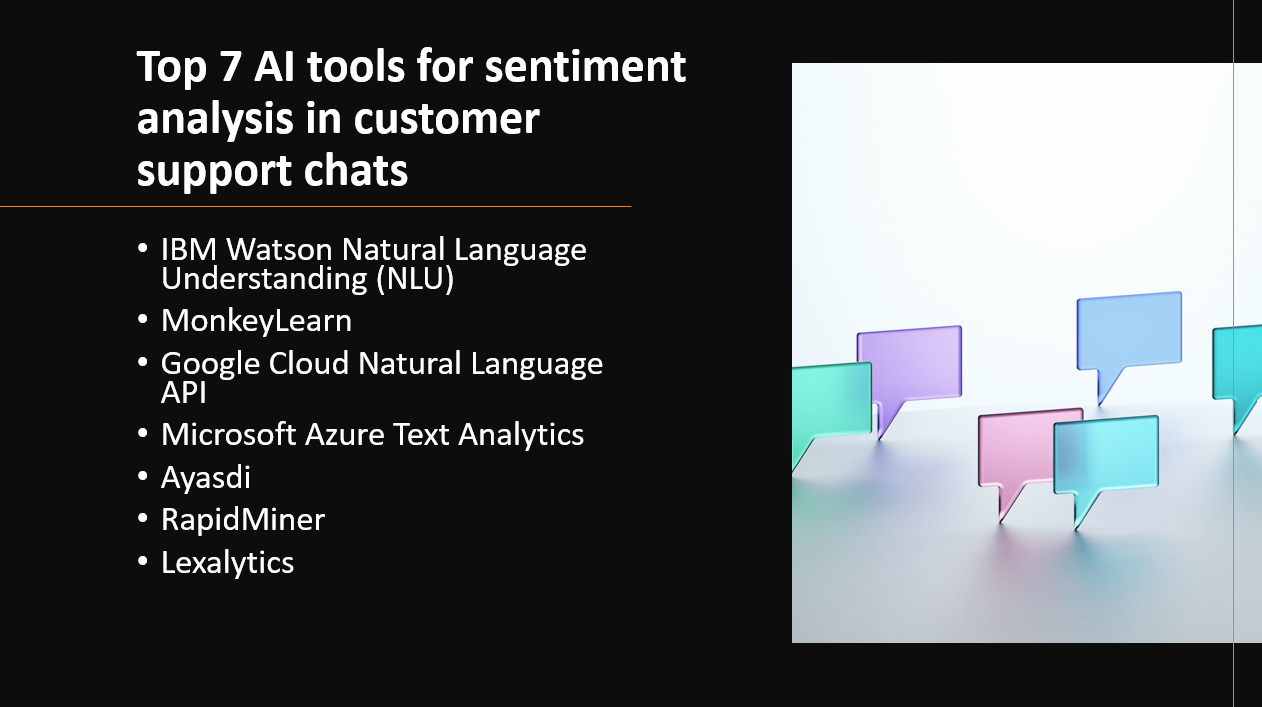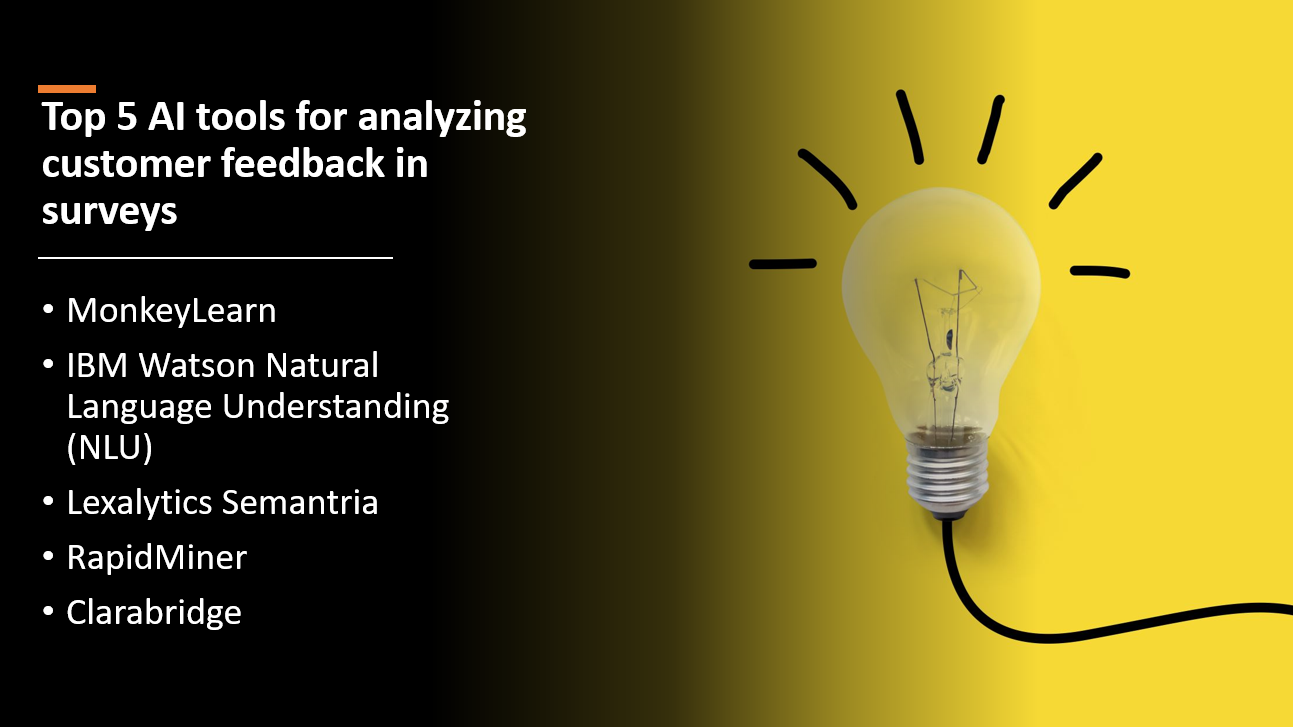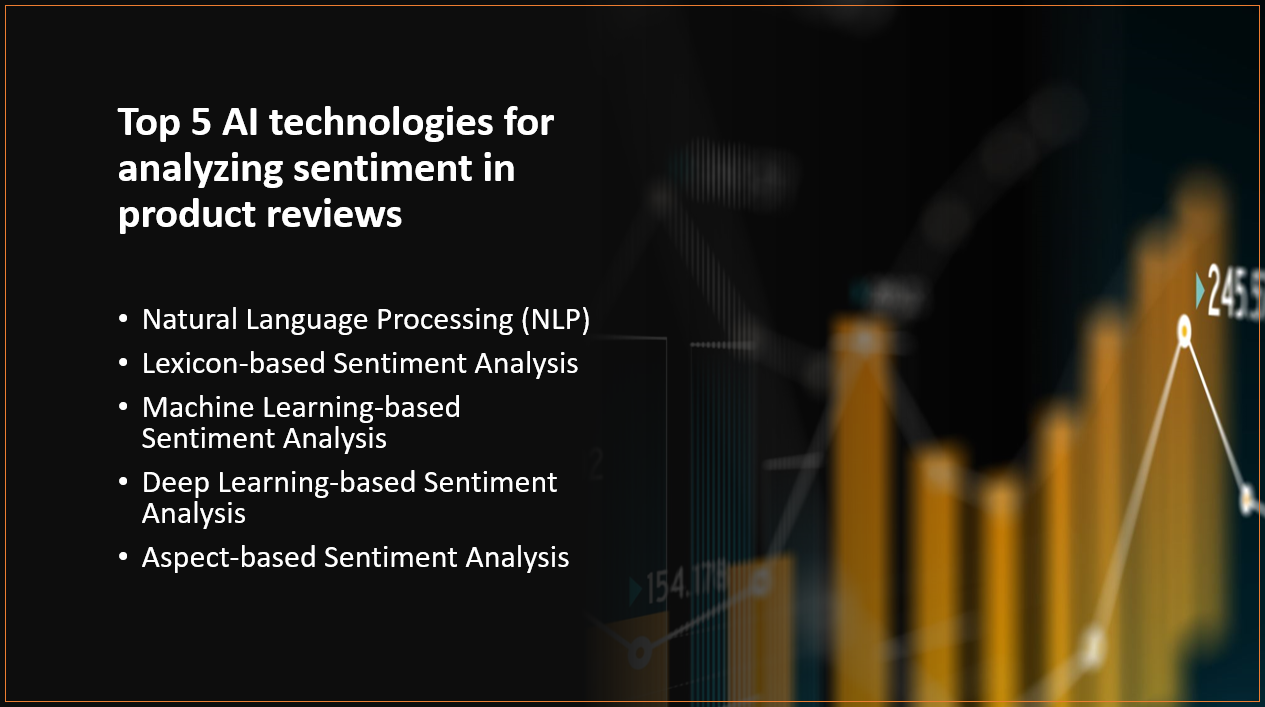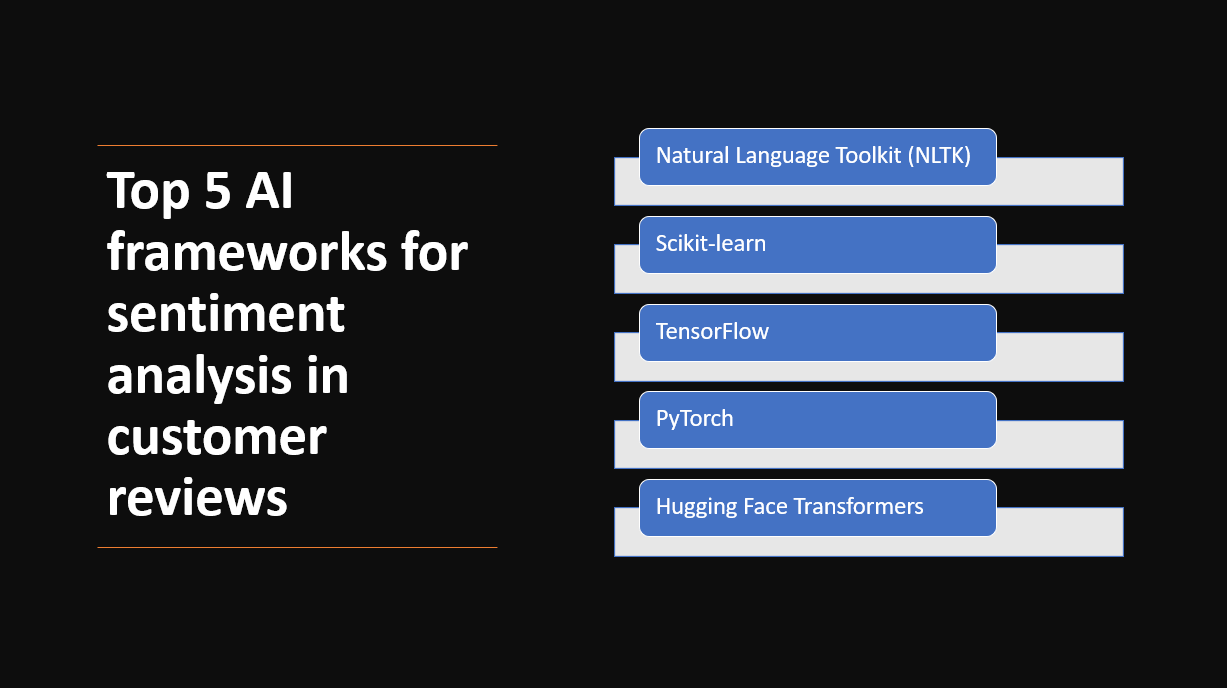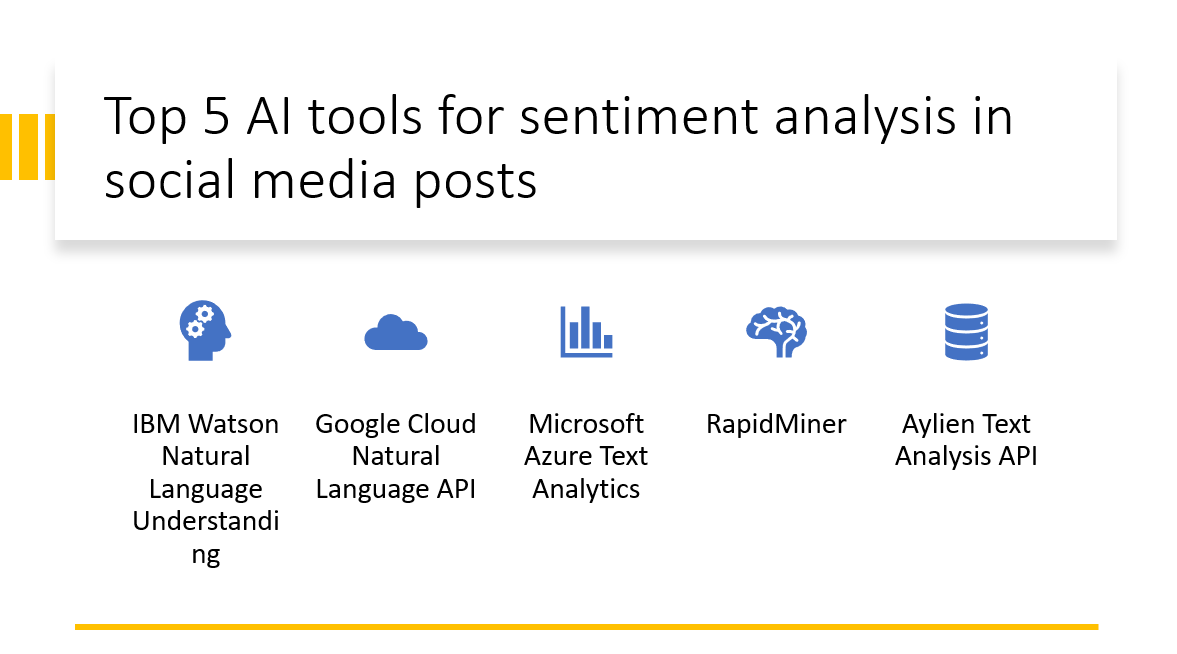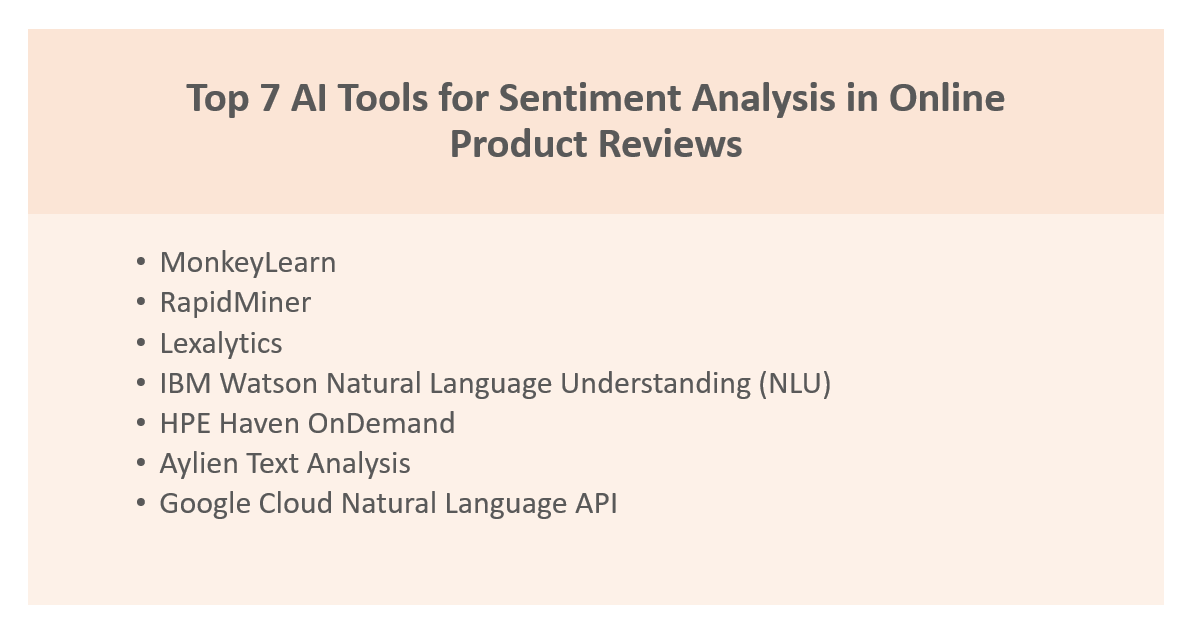
Introduction
Sentiment analysis plays a crucial role in understanding customer opinions and emotions expressed in online product reviews. Artificial Intelligence (AI) tools equipped with advanced natural language processing (NLP) algorithms can efficiently analyze large volumes of text data, providing valuable insights for businesses to gauge customer satisfaction and make data-driven decisions. In this blog post, we will explore the top seven AI tools for sentiment analysis in online product reviews, empowering companies to gain a deeper understanding of customer sentiments and improve their products and services.
Why use AI tools for sentiment analysis in online product reviews?
- AI tools process product reviews quickly, saving time and effort.
- AI algorithms accurately identify customer sentiments in reviews.
- AI-powered sentiment analysis allows prompt response to customer feedback.
- AI tools provide valuable insights for data-driven decision-making.
- AI platforms handle a large volume of online reviews effectively.
Related Reading:
Here's Our List of the Top 7 AI Tools for Sentiment Analysis in Online Product Reviews:
1: MonkeyLearn
A. Overview and Importance: MonkeyLearn is an AI-powered text analysis platform designed to perform sentiment analysis on online product reviews. It utilizes machine learning and natural language processing (NLP) algorithms to understand the sentiment expressed in text data. By automating sentiment analysis, MonkeyLearn helps businesses gain valuable insights from customer reviews, enabling them to make data-driven decisions, improve products and services, and enhance customer satisfaction.
Key Features and Capabilities
Sentiment Analysis Models
- MonkeyLearn offers pre-trained sentiment analysis models that can accurately classify product reviews into positive, negative, or neutral sentiments.
Custom Model Creation
- Users can build their own custom sentiment analysis models by training MonkeyLearn with their specific domain or industry data, tailoring the analysis to their unique requirements.
Integration and Automation
- MonkeyLearn provides APIs and integrations with popular platforms, allowing businesses to seamlessly integrate sentiment analysis into their workflows, automate the process, and analyze large volumes of product reviews efficiently.
2: RapidMiner
Overview and Importance
RapidMiner is an advanced AI tool used for sentiment analysis in online product reviews. It leverages machine learning and data mining techniques to extract and interpret sentiments from textual data. RapidMiner's user-friendly interface and powerful analytical capabilities make it a valuable tool for businesses looking to understand customer sentiments, improve product offerings, and make informed decisions based on customer feedback.
Key Features and Capabilities
Text Processing and Preprocessing
- RapidMiner provides a range of text processing and preprocessing functions to clean and transform textual data, preparing it for sentiment analysis.
Sentiment Analysis Models
- RapidMiner offers built-in sentiment analysis models that can automatically classify reviews into positive, negative, or neutral sentiments.
Model Customization
- Users can fine-tune and customize sentiment analysis models based on their specific domain and language requirements, improving the accuracy and relevance of the analysis.
Related Reading:
3: Lexalytics
Overview and Importance
Lexalytics is a leading AI tool for sentiment analysis in online product reviews. It utilizes natural language processing (NLP) and machine learning algorithms to accurately gauge the sentiment expressed in textual data. Lexalytics is widely used by businesses to gain valuable insights from customer feedback, identify trends, and make data-driven decisions to improve their products and services.
Key Features and Capabilities
Sentiment Analysis Engine
- Lexalytics employs a powerful sentiment analysis engine that can accurately determine the sentiment polarity of product reviews, including positive, negative, or neutral sentiments.
Aspect-Based Sentiment Analysis
- The tool goes beyond overall sentiment to perform aspect-based sentiment analysis, enabling businesses to understand the sentiment associated with specific product features or aspects.
Multi-Language Support
- Lexalytics supports sentiment analysis in multiple languages, making it suitable for businesses operating in diverse global markets.
4: IBM Watson Natural Language Understanding (NLU)
Overview and Importance
IBM Watson Natural Language Understanding (NLU) is a cutting-edge AI tool used for sentiment analysis in online product reviews. Powered by advanced NLP and machine learning technologies, NLU can process vast amounts of textual data to extract insights about customer sentiments and emotions. Businesses leverage NLU to gain a deeper understanding of their customers' feedback, improve products, and enhance overall customer satisfaction.
Learn more about IBM Watson NLU
Key Features and Capabilities
Sentiment Analysis
- IBM Watson NLU provides robust sentiment analysis capabilities to determine the sentiment expressed in product reviews, allowing businesses to gauge customer satisfaction levels.
Entity Recognition
- The tool can identify and extract entities, such as product names, brand mentions, and attributes, from the reviews, aiding businesses in identifying key areas for improvement.
Emotion Analysis
- NLU can detect emotions expressed in the text, helping businesses understand how customers feel about their products and services.
Related Reading:
5: HPE Haven OnDemand
Overview and Importance
HPE Haven OnDemand is a powerful AI tool used for sentiment analysis in online product reviews. It offers a comprehensive set of APIs and services that enable businesses to analyze and extract valuable insights from textual data. With its advanced NLP and machine learning capabilities, HPE Haven OnDemand empowers businesses to understand customer sentiments, identify trends, and make data-driven decisions to enhance their products and services.
Learn more about HPE Haven OnDemand
Key Features and Capabilities
Sentiment Analysis API
- HPE Haven OnDemand provides a dedicated API for sentiment analysis, allowing businesses to assess the sentiment expressed in product reviews and classify them as positive, negative, or neutral.
Entity Extraction
- The tool can identify and extract entities, such as product names, brand mentions, and attributes, from the reviews, helping businesses gain insights into specific aspects of their products.
Topic Modeling
- HPE Haven OnDemand offers topic modeling capabilities to identify key topics and themes discussed in the reviews, enabling businesses to understand the most relevant aspects affecting customer sentiment.
Related Reading:
6: Aylien Text Analysis
Overview and Importance
Aylien Text Analysis is an advanced AI tool designed for sentiment analysis in online product reviews. It leverages cutting-edge natural language processing (NLP) techniques to analyze and interpret the sentiments expressed by customers in their reviews. The tool plays a crucial role in helping businesses understand customer feedback, gauge product satisfaction levels, and make data-driven decisions to improve their offerings.
Learn more about Aylien Text Analysis
Key Features and Capabilities
Sentiment Analysis
- Aylien Text Analysis offers sentiment analysis capabilities that accurately determine the sentiment polarity of product reviews, classifying them as positive, negative, or neutral. This feature aids businesses in understanding overall customer satisfaction and identifying areas for improvement.
Aspect-based Sentiment Analysis
- The tool can perform aspect-based sentiment analysis, enabling businesses to extract sentiments related to specific aspects or features of their products, providing more granular insights.
Customization
- Aylien Text Analysis allows users to customize the sentiment analysis model according to their domain-specific requirements, ensuring better accuracy and relevancy in sentiment classification for different product categories.
7: Google Cloud Natural Language API
Overview and Importance
The Google Cloud Natural Language API is a powerful AI tool for sentiment analysis in online product reviews. It is a part of Google Cloud's suite of AI and NLP services, designed to help businesses gain valuable insights from customer feedback. The API uses state-of-the-art machine learning algorithms to analyze the sentiment expressed in product reviews, allowing businesses to understand customer satisfaction levels and make data-driven decisions to enhance their products and services.
Learn more about Google Cloud Natural Language API
Key Features and Capabilities
Sentiment Analysis
- The Google Cloud Natural Language API excels in sentiment analysis, accurately identifying the sentiment polarity of product reviews, ranging from positive to negative or neutral. This capability enables businesses to gauge overall customer satisfaction and sentiments toward specific products or features.
Entity Recognition
- The API can also perform entity recognition, identifying and categorizing key entities mentioned in the reviews, such as product names, brands, or attributes. This helps businesses understand which aspects of their products are being praised or criticized the most.
Multi-language Support
- The Google Cloud Natural Language API supports multiple languages, allowing businesses to analyze product reviews written in different languages, broadening the scope of their customer feedback analysis.
Conclusion
AI tools are significant for sentiment analysis in online product reviews, offering valuable insights to businesses. The top seven tools are MonkeyLearn, RapidMiner, Lexalytics, IBM Watson NLU, HPE Haven OnDemand, Aylien Text Analysis, and Google Cloud Natural Language API. These tools efficiently analyze and extract sentiments from reviews, enabling businesses to improve product development, marketing strategies, and customer satisfaction. By adopting AI-powered sentiment analysis, businesses can make data-driven decisions and enhance their products and services based on customer feedback, leading to increased customer satisfaction and loyalty.

